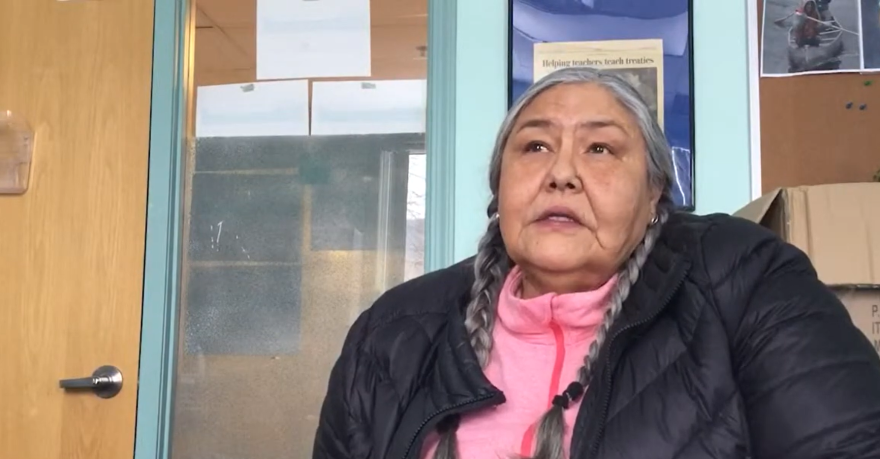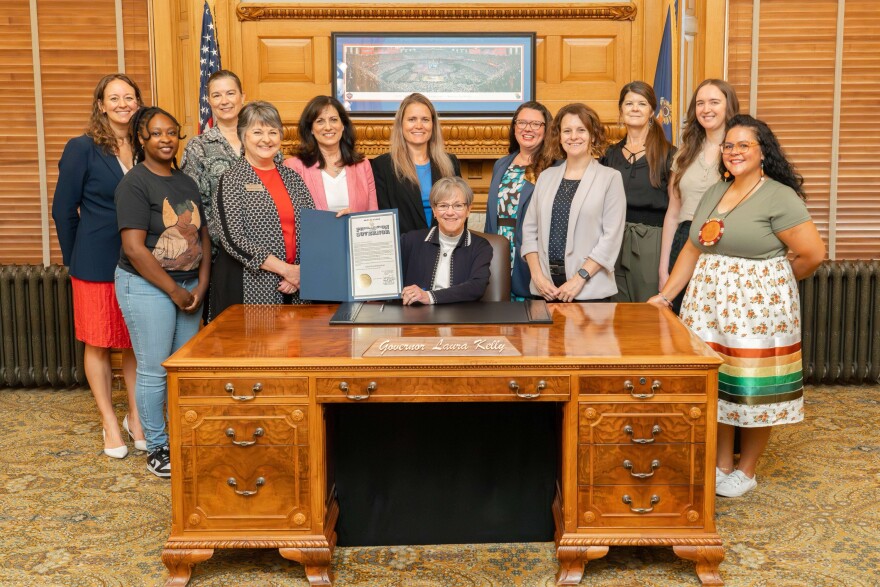Stephanne Rupnicki and Sapphire Garcia are trading stories about their shared passion for supporting new and expecting moms on a Wednesday afternoon in August. Their focus is on Indigenous women, who they feel have needs not met by the health system.
It’s an experience they’ve both lived.
Rupnicki, leader of the Prairie Band Potawatomi Nation Breastfeeding Coalition, wasn’t able to breastfeed her first child for more than three months and said she found little support. Garcia, founder and director of the Kansas Birth Justice Society, lost her second child during her pregnancy and feels the doctor dismissed her concerns.
Whether a complication before birth or a lack of resources after, Indigenous women in Kansas experience worse maternal mortality outcomes on average than their white counterparts. Garcia said modern practices are failing Native families because they don’t take culture into account.
“They're not just a body pushing a baby out,” Garcia said. “It’s them as a person. That involves their spirit. Who they are: their family, their beliefs, their culture. ”
The need for this holistic approach is why Garcia and Rupnicki are teaming up to train a cohort of doulas to help Native women.
Doulas are advocates and educators for pregnant women. But their roles often extend further, like being on call 24/7 to answer texts from expecting moms. They might even serve as a bridge between patients and health care providers.
While they aren’t physicians, the support they offer can be lifesaving. Moms who used doulas are two times less likely to experience birth complications and four times less likely to give birth to an underweight baby, according to the National Institutes of Health

The doulas selected for this cohort are from the communities they plan to serve. There are people in this cohort from the Prairie Band Potawatomi Nation, the Kansas Kickapoo, Sac and Fox and Iowa tribes. Haskell Indian Nations University is also represented.
According to a review published earlier this year looking at Indigenous women’s views on Western birthing practices, the need to leave their community for care increases anxieties that can contribute to complications. Being forced outside Indigenous circles also led to a loss of birthing knowledge within the community, as did historic underfunding of tribal health care.
Systemic barriers and discrimination also played major roles in skepticism of existing services.
“We can't wait for Western medicine to validate that there's a value in reclaiming one's cultural practices,” Garcia said.
Cultural barriers
In her role with the Prairie Band Potawatomi Nation Breastfeeding Coalition and in her lived experience, Rupnicki has seen how generations of trauma have created hesitancy from Native families toward outside health care.
Rupnick is a recognized member of the Kickapoo tribe of Kansas and a married mother of six residing on the Prairie Band Potawatomi Reservation. In addition to her local breastfeeding work, she serves on the Kansas Breastfeeding Coalition Board of Directors and is working to create a statewide Indigenous breastfeeding group.
This wide lens of work across Kansas gives her perspective on the dichotomy of life for many Native American residents.
“We live in two different worlds,” Rupnicki said. “One where we’re claiming ourselves and our indigenous entity and then also we're met with that outside world of colonization.”
Between 1999 and 2019, the increase in the number of Indigenous pregnant women dying in Kansas was 162%, fifth worst in the country. Common causes included bleeding after birth and infection.
Some of these deaths are attributed to mental health struggles, be it postpartum depression, psychosis or pressures from a system that doesn’t accommodate their culture. Most are preventable.
Rupnicki also believes the number to be even higher, as underreporting is common.
Doulas can help repair this frayed relationship, she said, speaking from personal experience with maternal support services.
“It wasn't until my third son that I had a breastfeeding peer counselor who helped support me,” she said. “I was able to breastfeed him for 26 months, compared to 3 months with my first.”
Leslie Ann Wilson of the Lakota sits on a panel of grandmothers working to help reintegrate Indigenous culture in birthing practices and women's health. She told the National Center for Collaboration in Indigenous Education that the way most deliveries happen is restrictive of culture.
She compared this restrictive nature to being tied to the bed.

Indigenous doulas support a variety of practices and rituals, like smudging, a practice where medicinal plants are burned and wafted over the body to cleanse their spirit. Labor can also include drumming, singing and herbal remedies. Some practices commonplace for quite some time are even getting backing from Western sources, like delayed umbilical cord clamping.
Once, these skills were passed down from one generation of midwives and doulas to the next through word of mouth and demonstration, but through federal and state policies, that line was broken. Now, workshops taught by people like Wilson can bring them back.
She sees an added vibrancy and confidence in the women she works with on birthing plans.
“It's for the women to feel confident and empower them to take back their own sovereignty over their own bodies by birthing their babies and having more of a say,” Wilson said of the role doulas play.
A cohort from the community
Last year, the Kansas Department of Health and Environment announced the state’s Medicaid program would cover doula services. It was a policy that folks like Garcia and Rupnicki had been seeking for years.
In fact, they even convened a group of doulas of color to help inform what that reimbursement policy with Medicaid would look like. So when KDHE announced the policy, it was time to get to work on cohorts that meet the needs of those communities.
Training for the first cohort of Indigenous doulas is already underway. They’ll train on practical skills — things like advocating for moms in medical settings and different complications that might pop up — and blend that with their lived experiences.
“I can teach doula skills but I can't teach culture,” Garcia said in a recent conversation with Rupnicki and the Kansas News Service. “This is a resurgence, a remembering of older ways.”
“I completely agree,” Rupnicki said in response. “It gives us the formal education and knowledge that we need to protect ourselves and create the safety net.”

Right now, they are meeting virtually, but some of the program will be in person. A hybrid format brings people in from across the state and allows some new moms to participate.
They hope to have everyone graduate in the next few months, ready to integrate cultural traditions of community-based birthing.
“The whole point of birth work is that we create this solid foundation of family and community, having all the aunties and everybody in this community helping to raise these children,” Rupnicki said. “That's when our language immersion happens. That's when our practices are taught.”
Noah Taborda reports on health care for the Kansas News Service.
The Kansas News Service is a collaboration of KCUR, Kansas Public Radio, KMUW and High Plains Public Radio focused on health, the social determinants of health and their connection to public policy.
Kansas News Service stories and photos may be republished by news media at no cost with proper attribution and a link to ksnewsservice.org.






